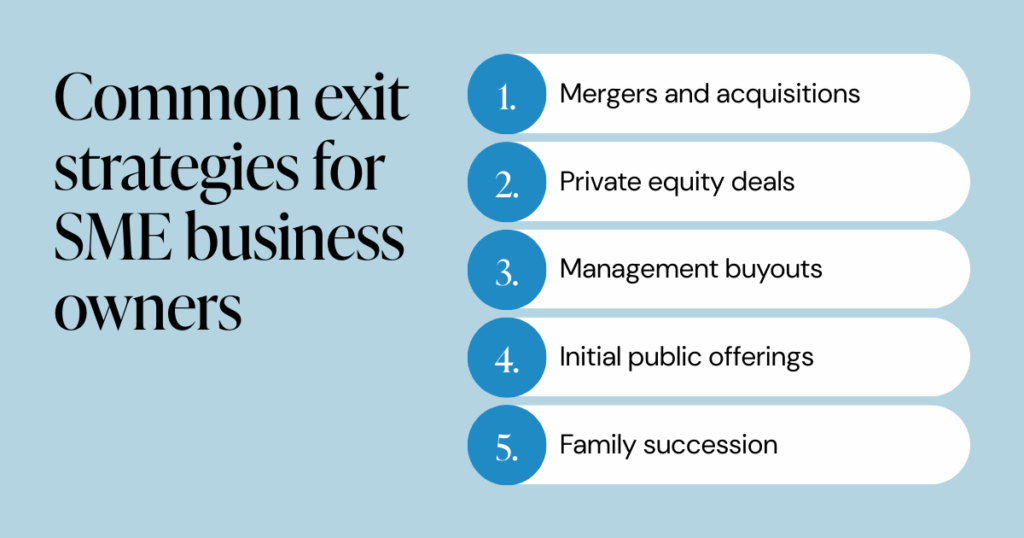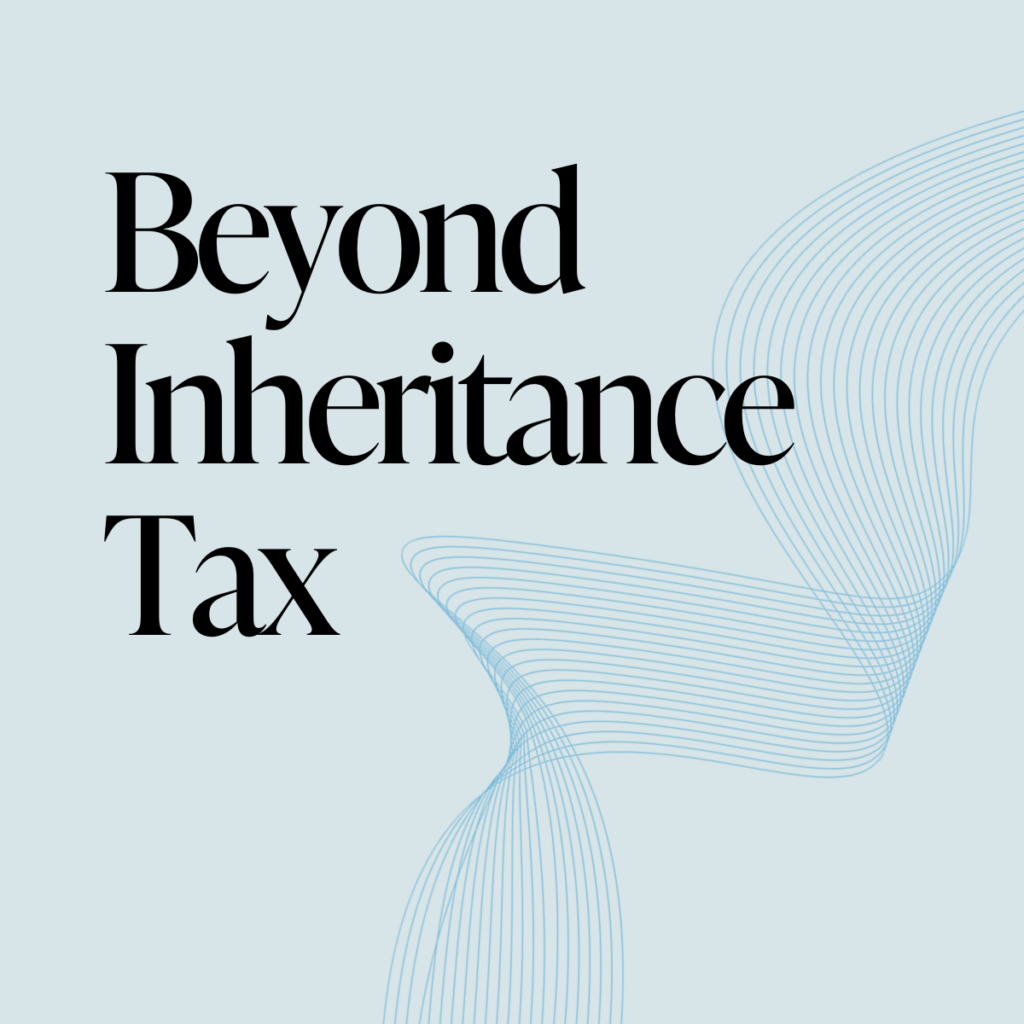Insights
The entrepreneur’s guide to exit planning & business exit strategies
From key considerations and common challenges to exit strategy examples, learn how to create a successful exit plan for your business.
6 September 2025
Having dedicated time, effort and energy into building a business, many entrepreneurs will look to exit at some point. They may not have fully considered what a future exit event could look like, however, nor how best to achieve it. Indeed, research suggests that almost half (48%) of business owners have no exit strategy in place.
While some parts of the exit process may be outside of your control, that’s even more reason to be prepared, as early and effective exit planning can have a positive impact on exit outcomes. And even if you have no immediate plans to exit, you can still benefit from having a formalised exit strategy right from the start.
In this guide for business owners, learn about the importance of business exit planning and when to start the process, plus some of the most common exit routes for small and medium-sized enterprises (SMEs). We’ve also included real-life examples of successful exits from our portfolio, to help guide you on your journey.
What is business exit planning?
Exit planning is the process business owners undertake when preparing to ‘exit’ their companies. A business exit can take many forms, including selling all or part of a company, passing it on to family members, merging it with a competitor or complementary business, or listing it on a stock exchange. Depending on the terms of the deal, owners may leave the business entirely or stay involved, after the exit.

Why is exit planning important for business owners?
No matter the exit route, planning ahead can help business owners to ensure a successful exit and a smooth transition for all stakeholders.
Effective exit planning could help you to:
- Increase the value of your business, for maximum returns at exit
- Maintain stability in the future ownership structure and direction of your business
- Attract investment, particularly from investors focused on exits (like private equity and venture capital firms)
- Lay the groundwork for a constructive relationship with potential new owners
- Safeguard the interests of shareholders and employees, post-exit
When should you start exit planning?
Early exit planning is important because of the amount of groundwork required to achieve a successful exit. And developing a business exit strategy early on means you’re prepared to move when the time is right (whether that’s driven by personal/professional circumstances or market conditions).
In fact, some argue that exit planning should inform an entrepreneur’s thinking from day one, in order to:
- Guide your decision making, when setting business objectives and growth targets
- Mitigate risks for business owners
- Inform your recruitment, training and succession planning
- Secure funding for your business, by showing investors the potential for high returns
What are the most common exit strategies for business owners?
Perhaps one of the most crucial aspects of business exit planning is choosing the right method of exit. Some common exit strategies for SME business owners include mergers and acquisitions, private equity deals, management buyouts, IPOs, and family succession. We go into more detail on each of these exit strategies below:
Mergers and acquisitions (M&A)
Exiting your business via a merger or acquisition involves selling it, either wholly or in part, to another company.
For SMEs, a common type of M&A exit is a trade sale, where it’s sold to another business (often a competitor or larger organisation), typically operating in the same market sector. The due diligence required for a trade sale, though rigorous, tends to be far less complex and time-consuming than other business exit strategies.
As well as being a popular exit strategy for business owners looking to sell, business acquisitions can also be an effective growth strategy for buyers. For instance, the new owners may be looking to:
- Increase their geographic footprint
- Diversify their product offering
- Acquire your company’s infrastructure, talent or intellectual property (IP)
Planning a strategic acquisition?
Acquisitive growth strategies can be highly effective, when executed well.
Learn more
Private equity deals
An entrepreneur looking to exit may choose to sell all or part of their business to a private equity (PE) firm.
Typically, PE firms are looking to generate a significant return within a few years of their investment. And following the business sale, they may inject additional capital and/or provide strategic guidance to help it scale-up. Some firms may also make structural changes to the business post-deal, with the aim of increasing its profitability and valuation.
Management buyouts (MBOs)
A management buyout involves an existing management team buying a majority stake in the business. The management team will often use external financing, such as bank loans (a type of debt financing) or investment from a private equity firm (equity financing), to fund the deal.
Successful MBOs help to ensure business continuity, following the sale, and can be highly motivating for employees taking ownership.
Initial public offerings (IPOs)
An IPO is a type of exit event, where a company’s shares are offered to the public for the first time, with the shares being listed on a stock exchange, where they can then be traded.
‘Going public’ via an IPO can generate significant capital for a business, but only if there’s sufficient demand for its shares, so this exit strategy requires considerable preparation.
Family succession
Family succession involves the transfer of business ownership to family members.
While it may sound simple, family succession still requires careful consideration, given the potential challenges that can arise from such a leadership transition (for instance, future Inheritance Tax implications). For family businesses with ambitious growth plans, succession planning is often central to their exit strategies.
What’s the best exit route for your business?
For the past decade, acquisitions have been the dominant exit strategy for high-growth companies in the UK. But when it comes to exits, there’s no one-size-fits-all approach.
Every entrepreneur will have a different set of goals when building a business: some may be pursuing a high-value exit to finance other ventures, while others may be more focused on maintaining company culture, and plan to stay on/retain some level of managerial control of the business, post-exit.
To help determine the best exit strategy for you and your business, first ask yourself these questions:
- What do you want the ownership and management structure look like?
- Do you want to retain a share of the business?
- Do you want to stay in a decision-making role?
- Do you want the business to continue operating in the same way?
- What’s the optimum valuation for your business, at time of exit?
How to create a successful exit strategy for your business
An effective exit strategy will look different for every company, depending on your business goals, growth strategy, and chosen exit route (as well as factors like size and industry). There are several key points to consider when exit planning, however, to help ensure success.
Key steps in the exit planning process:
- Determine your exit goals as early as possible, setting clear objectives and timelines
- Critically assess your business plan and performance, in line with these goals
- Determine your business valuation at the start of the process (and develop your exit and business strategy with maximum value/sale price in mind)
- Carry out due diligence, benchmarking your business against your competitors
- Establish your preferred exit route, taking all key stakeholder interests into account
- Identify and generate interest from potential buyers that could be a good match to your business (and consider any requirements they may have)
- Ensure you have a robust succession plan in place, to help prepare future business leaders for their new roles
- Consider all likely legal, financial and operational contingencies (and produce multiple plans of action, with these in mind)
- Seek advice and support from experts, where you need it
- Regularly review your exit strategy, as your business evolves or market conditions change (and be willing to adjust your plans, as required)
- Time the exit right
How do you know when it’s the right time to exit your business?
One of the most common challenges in business exit planning is in getting the timing right.
The truth is that it’s not always possible to know when to exit, as there are so many factors to consider and the market can change quickly. But this uncertainty further underlines the importance of flexibility, when it comes to exit planning, as well as early preparation.
A successful business exit means having all the pieces in the right place. Always consider market conditions, and don’t rush into a sale process, before doing the work to get your financials and operations in order or running due diligence on any prospective buyers.
How can you generate interest in your business from potential buyers?
In a favourable market, great companies often attract buyers – but engaging in a thoughtful way can still help raise your profile, prepare potential buyers, and increase the sale price of your business (especially if there’s competitive tension in the market).
You can do this through:
- Engaging with financial advisers, who can help you approach acquisitive businesses or investors with a strong track record in your sector
- Profile raising activity, like PR, conferences and awards
- Making sure all your financial, legal, and commercial documents are in order, before speaking with potential buyers
- Preparing detailed information packs that highlight your company’s strengths, financial performance, and any future growth opportunities
And again, starting early is crucial.
Post-exit perspective
Learn how award-winning software developer Amdaris was acquired by a Fortune 500 firm.
Read the case study
Exit planning for business owners targeting maximum returns
Exits are an important part of strategic planning for entrepreneurs looking to maximise returns. To achieve this, owners should focus on building value in their businesses.
Maximising business valuations at exit
Business valuations are often carried out with the help of financial advisers. They’re usually based on some fundamental measure of performance, such as a company’s EBITDA (earnings before interest, taxes, depreciation, and amortisation), which is then adjusted for variables like cash and net debt.
High earnings imply a high valuation, so business owners will often do all they can to increase their earnings, ahead of an exit event. But, to get from earnings to an overall valuation for your business, analysts will typically apply a multiple of some kind (for instance, they may value a business at 5x EBITDA). So, in the run up to an exit, business owners also aim to maximise this multiple, in order to maximise the sale value.
The multiple for your business will depend on several factors, including:
- Your company’s growth rate
- Size and defensibility of your market share
- Originality or uniqueness of your products
- The multiples of other businesses in your sector
Potential buyers may have different views on the correct multiple for a privately-owned business, so exit planning involves making a good case for a high multiple (i.e. one that’s strong enough to persuade potential buyers), as well as finding and addressing any weaknesses in advance.
Creating a business exit plan with your investor
Developing (and delivering) a solid exit strategy can be a difficult undertaking for business owners, especially if you don’t have access to professional advisers, like many small businesses. If you’ve raised external capital, however, your investors may be able to support you in this process.
BGF, for instance, provides SMEs with patient capital and ongoing scaleup support — working in partnership with business owners, to unlock value and prepare them for a future exit event.
Examples of successful exit strategies
So far, we’ve helped hundreds of business owners achieve a successful exit, at a time that’s right for them. Read some of their growth and exit stories below:
Or listen to Grant Keenan, Founder of Keenan Recycling, reveal how he turned a humble composting operation into a national force, with 21 depots and 140+ employees, before exiting to industry giant BIFFA — in this episode of The Good Growth Podcast:
The information contained in this article is for general information and use. It does not constitute any form of advice and is not intended to be relied upon in making any investment decision. Independent advice should always be sought as to whether a particular transaction is suitable having regard to your personal and financial circumstances.










